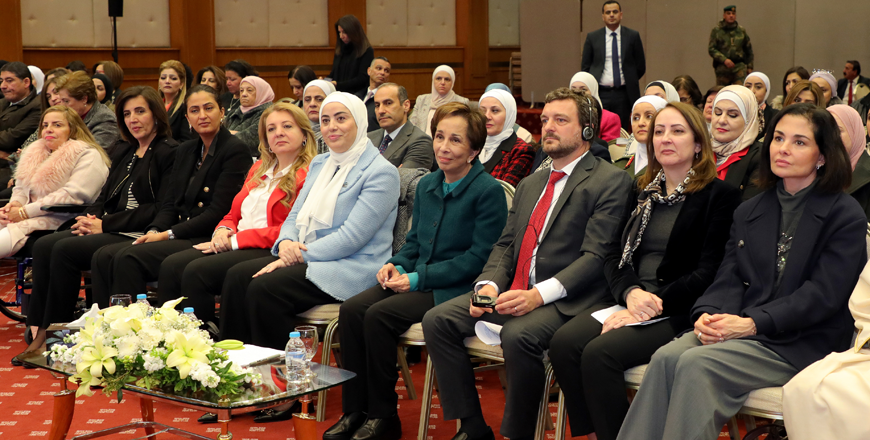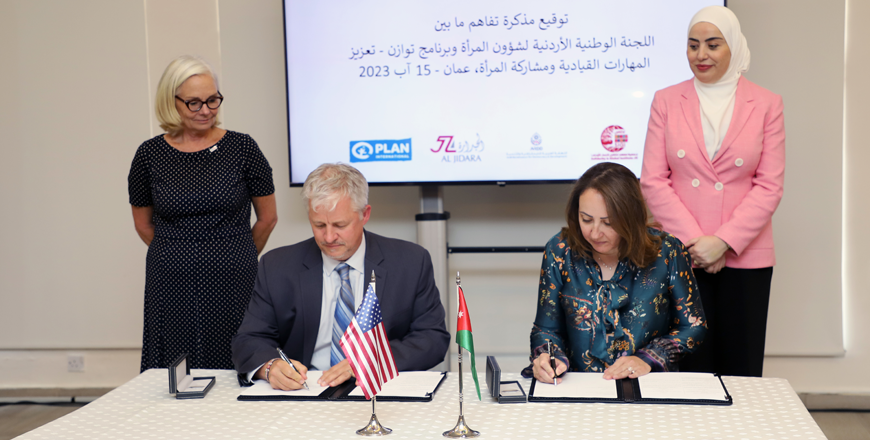You are here
Women’s issues must remain ‘top priority’ — Princess Basma
By Rana Husseini - Mar 20,2023 - Last updated at Mar 21,2023

HRH Princess Basma and guests during the Jordanian National Commission for Women’s commemoration of International Women’s Day in cooperation with UN Women in Amman on Monday (Petra photo)
AMMAN — HRH Princess Basma on Monday said that women’s struggles and sacrifices should always be commemorated and glorified.
The princess’s remarks were made during the Jordanian National Commission for Women’s (JNCW) commemoration of International Women’s Day in cooperation with UN Women.
Princess Basma acted as patron to the event, which was held at the Royal Cultural Centre in Amman.
Such important occasions, Princess Basma stressed, should work to increase “our efforts to motivate and empower women everywhere”.
“We need to ensure that women’s issues remain a top priority, and to stand next to them at all times,” Princess Basma stressed.
The princess pointed out that this year’s celebrations come in light of the repercussions of many crises the world has gone through, especially the COVID-19 pandemic and its impact on the world’s most vulnerable groups.
At the same time, the princess added, it comes “at a time when the burdens on women have increased, and pushed many out of the labour market, which has witnessed a regression on the Women, Business and Law Index.
Minister of Social Development, Wafa Bani Mustafa, said that His Majesty King Abdullah on several occasions has stressed the need to strengthen democratic values and the importance of women’s contribution to the sustainable development process, while implementing concepts of justice and integrity.
“Jordan seeks to increase women’s economic participation, while adopting national plans and policies, including Jordan Vision 2025,” added Bani Mustafa who is the chairperson of the Inter-Ministerial Committee for the Empowerment of Women.
Bani Mustafa stressed that the Kingdom is always striving to be among the leading countries in fulfilling its international obligations with regard to human and women’s rights and equality.
Secretary General of the JNCW Maha Ali said the Kingdom is entering its second centenary with a supportive political will to enhance the role of women and empower them in various fields.
This, Ali stressed, has helped women gain more achievements on the legislative and political levels.
Also addressing the gathering was UN Women Country Representative Nicolas Burniat said commemorations for women’s achievements should be on a daily basis.
“Women contribute to society. Women lead, every single day. We should therefore not recognise the essential role played by women in our societies only once a year, but every day too,” Burniat said.
The UN official warned that “it would take close to 300 years — 300 years — to reach gender equality globally, based on a recent study released by UN Women”.
“At the current pace, ensuring equality of men and women before the law, changing all laws discriminating against women will take over 286 years,” according to Burniat.
Meanwhile, ensuring equal representation of women in leadership positions in the workplace will take 140 years, while ensuring equal representation of women in national parliaments will take 40 years, Burniat added.
Also during Monday’s event, the JNCW launched its 2023-2025 National Strategy for Women.
The strategy seeks to ensure a society free of discrimination and gender-based violence, where women and girls enjoy full human rights and equal opportunities toward inclusive and sustainable development.
The strategy focuses on achieving several goals, such as enabling women and girls to exercise their economic, political and human rights while living in a society free of gender-based discrimination.
Other goals include ensuring positive gender norms, roles and attitudes that support gender equality and women’s empowerment.
In addition, the strategy aims to ensure that institutions execute and maintain policies, structures and services that support gender equality and women’s empowerment in alignment with Jordan’s national and international commitments.
The Action Plan for the strategy is the culmination of national participatory efforts between the JNCW, the Ministry of Planning and International Cooperation and the Inter-Ministerial Committee for the Empowerment of Women and supported by UN Women.
The Action Plan contains six pillars, including economic empowerment, humanitarian rights, political empowerment and participation in public life, combating violence against women and girls, community culture and gender mainstreaming in public and private sector institutions.
Ali concluded by saying that “we completed the work on the executive plan, which still needs the approval of the relevant ministerial committee”.
“Once we get the approval, we will be announcing the final executive plan with more details,” Ali said.
Related Articles
AMMAN — In step with the Kingdom’s three-dimensional path to modernisation, the National Conference on Women’s Paths in the Modernisation Vi
AMMAN — The Jordanian National Commission for Women (JNCW) signed a memorandum of understanding (MoU) with USAID Tawazon - Promoting the Voi
AMMAN — Women leaders have praised a recent decision by the Inter-Ministerial Committee for Women’s Empowerment (IMCWE) to adopt the N















